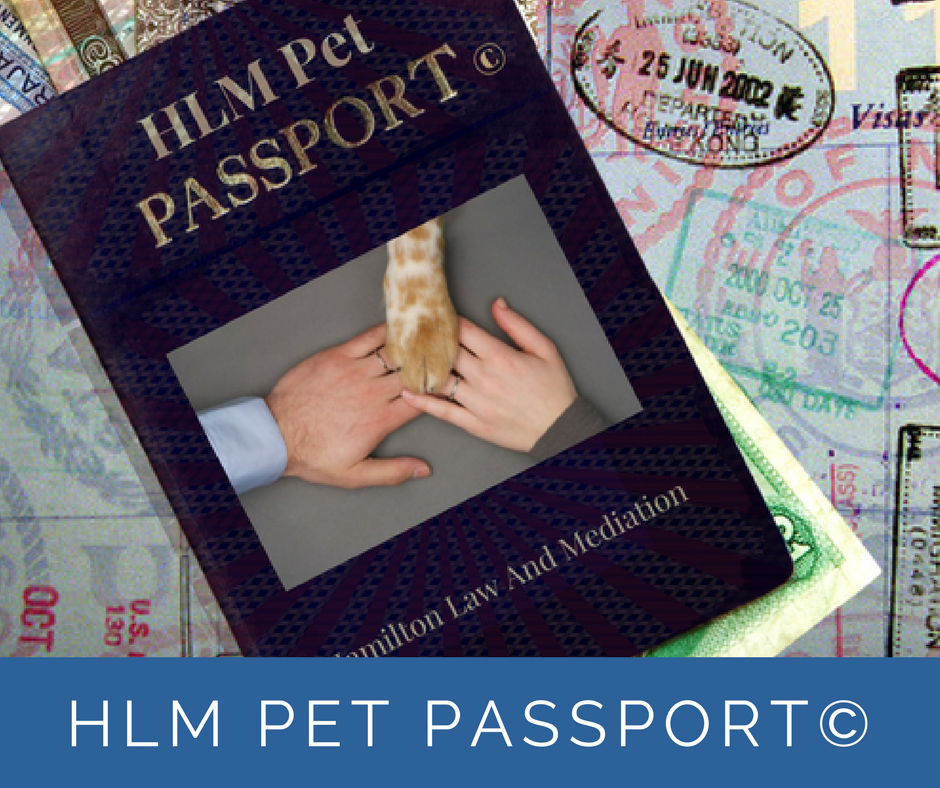
Who Gets The Pet?
When people are considering a divorce, no one ever asks who is going to get the pet[s]. I’ve had attorneys call me at the very last minute when everything is settled and ready to sign, except for who gets the pet. Whether it’s a cat, dog, horse, parrot, or reptile, who gets that pet is an important first question to ask clients.
Several states, including California, Alaska, Illinois, and New York have amended their Domestic Relations laws to reflect the importance of a pet in divorce. It is a fact pets are not ‘just property’ to be split as marital assets. Pets are now a hybrid property that commands a discussion on well-being and best-interests during divorce proceedings.
Judges are assigned the difficult task of taking the information supplied by the parties and deciding which person the pet will be awarded to. There is no shared custody, that would be too difficult to administer. The judge decides who gets custody of the pet.
What Judges, Attorneys, and Pet Owners Need To Know
This new legislation does not provide the best outcome for the pet(s). Pets have been awarded to parties who write more artfully or who remain with the pet in the family home. The one thing missing from these discussions is the feelings of the pet. Pets do not hate the ex-spouse. In fact, if they were left by one party they would cling to the other. Awarding the pet to one ex-spouse with no hope of visitation by the other creates two serious issues: the ability to share the pet and the ability to share the expenses of the pet.
What if the possessory party can no longer keep the pet? As far as I can tell, nothing is put in place by the court that requires the party to call their ex first before placing the pet. Nor are finances discussed. What if the pet gets sick? Can they reach out to the ex to have them help with the medical expenses? Why would the ex help if they don’t get to see the pet? Many unintended consequences are afoot in this seemingly innocuous legislative tweak that gives judges the duty to decide.
Mediation Provides A Better Way
A better way to handle these matters is to send them to mediation, where a neutral mediator can allow for a full discussion of the pets’ well-being and best interests. These are just the sort of conversations, ones of an emotional nature, that mediation was created to assist. No commercial or business mediator need apply. The well-being of the pet can and should be decided by the people who love it, if they are provided an opportunity in a neutral and safe setting.
When pets are awarded to one party, the other party usually loses touch with the pet. It is not uncommon for one ex to find that the other ex gave the pet to someone else or to a rescue. They do this without informing the non-possessory ex. If such notice is not required in the judge’s possession order it is not something the possessory ex will need to do.
Three helpful tips to follow when you are divorcing with a pet.
- First, if one spouse is more attached to the pet than the other perhaps that would be the most appropriate placement for that pet. Discussions need to remember what this pet meant in the relationship. Pets are usually the last-best thing in a relationship, especially when it’s crumbling. In the tabloids, all that’s talked about is who gets the pet or how they are sharing their pet when celebrity couples break up.
- Second, do not allow the parties to hold the pet for ransom. This becomes clear if one spouse will agree to anything to keep the pet. This is not the place to get even with an ex because it comes at the expense of the pet’s welfare.
- In mediation, this prospect is discovered early and diffused. A mediator can navigate this important discussion to a healthier conclusion. The parties will then decide to award the pet in a way that benefits the pet. Mediation encourages all parties to take the higher road, taking time to foster integrity in negotiations.
- Third, the custodial owner of the pet needs to assure the ex-spouse that they can see and spend time with the pet, especially if they want help with costs. When the custodial ex goes on vacation, why not offer the pet to the ex-spouse to watch? Maybe the ex can’t see the dog weekly or monthly because it would be disruptive to their ex or the pet. However, once or twice a year is great for the pet and the ex. It shows good faith. It would also give you peace of mind that the pet was with someone it knows.
Continuing The Conversation Once The Divorce Is Finalized
Talking about where the pet will be in everyone’s life once the divorce is final is imperative. You might want to create a document that outlines the process if something happens to the custodial pet parent. The pet would be offered to the non-custodial pet parent first before the pet is given away or placed. This will make it less likely that a pet would end up homeless or in a rescue by intent or accident. The pet would stay with a person that they know and love.
Quite frankly, the pet doesn’t understand why its parents aren’t together. If given a choice, the pet would pick your ex over anyone else if the custodial parent was not around. Right now you are angry at your ex-spouse. You want nothing to do with them. Remember, getting even at the expense of the pet you love, is not who you are.
Why not think of the pet’s best interests and well-being with your heart? Work out possession in a way that retains a relationship or a neutral ground on which to exchange the pet. It can be done if the pet’s long-term welfare is your primary goal. Give your beloved pet the opportunity to remain in the life of both of its parents.
Skip litigation at all costs, it doesn’t serve you or your pet. It takes time, money and is not worth the angst and emotional toll it takes on you and your pet.
Find Help Here
If you’d like to learn more or have your attorney learn more, please don’t hesitate to contact me at :www.hamiltonlawandmediation.com or dhamilton@hamiltonlawandmediation.com.
I look forward to helping you resolve any conflicts you are having regarding your pet and divorce without resorting to litigation.





